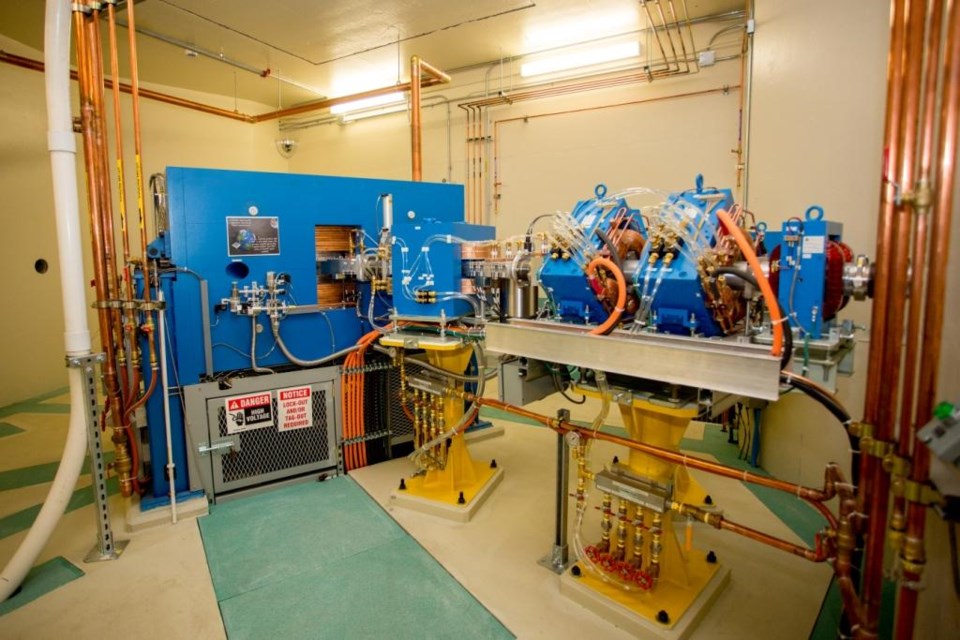THUNDER BAY — Almost three years after it became operational, the largest cyclotron in Ontario needs clearance from Health Canada to produce medical isotopes for patient care.
The $3.5 million machine was installed in a bunker at the Health Services Centre at 1040 Oliver Road in February 2015.
Including other costs, the project carried a price tag of close to $10 million.
The City of Thunder Bay contributed $1.5 million, and the two senior governments each gave $4 million.
The cyclotron became operational in early 2016 after receiving a licence from the Canadian Nuclear Safety Commission.
But Health Canada has yet to give the Thunder Bay Regional Health Research Institute the go-ahead to use radioactive isotopes for diagnostic imaging procedures on patients.
This leaves the Health Sciences Centre still acquiring isotopes from the Centre for Probe Development and Commercialization (CPDC) at McMaster University in Hamilton.
If the duration of the approvals process caught Thunder Bay hospital officials off guard, they won't admit to being frustrated.
Peter Myllymaa, Executive Vice-President at the Health Sciences Centre and COO of the Health Research Institute, describes it as a learning experience.
"There's times when you introduce something like this that you want things to move faster but you understand that there are certain regulations that need to be met. In this industry I guess you get frustrated by a number of things. This could be one of them, but you try not to get frustrated by it," Myllymaa said Friday in an interview with Tbnewswatch.
"This is something completely new to us. It has taken time to get there...Obviously we'd like it to be quicker, and to have these isotopes available for patients, but we would never do it to put patients at risk. We're going to make sure this is done safely," he added.
Myllymaa said if people in the community are surprised that locally-produced isotopes still aren't available for administration to cancer patients undergoing PET scans or CT scans, it's understandable.
The cyclotron is being used for research and other purposes
But he also wants residents to understand that, nonetheless, the cyclotron is being put to useful purposes.
It's producing non-clinical isotopes that can be used for research as well as the calibration of PET/CT scanners, an essential part of nuclear medicine.
The research part of the cyclotron's role has been "incredibly successful," Myllymaa said.
Two new Lakehead University-Health Research Institute research chairs have been appointed as a result of new research opportunities provided by the state-of-the-art equipment.
Myllymaa said " We are able to attract scientists here for that. Dr. Mike Campbell is looking at more than just the health of individuals He's looking at how he can use his research to help the mining industry do its work better and be less destructive."
The cyclotron has the potential to analyze the quantity of precious metals in ore samples.
Research and development connected to the device, Myllymaa said, will contribute to the growth of the knowledge industry in Thunder Bay.
It provides work for seven or eight people directly.
There is no set date yet, however, for the final federal regulatory approval for patient applications for Thunder Bay-made isotopes.
In 2017, Health Canada confirmed that the cyclotron met the requirements for production of fluorodeoxyglucose, a radiopharmaceutical used to “light up” cancer cells during PET imaging for diagnosis, treatment planning, and treatment monitoring.
What it still requires, Myllymaa said, is a Drug Establishment licence from Health Canada that is only issued once the department is satisfied that the processes at the Thunder Bay facility can be carried out consistently and safely for patients in a clinical setting.
A federal inspection team visited the cyclotron at the beginning of this year, and determined the facility was substantially compliant with licence conditions.
But the team also identified some issues that still needed to be addressed.
One requirement was to appoint a Quality Assurance Manager independent of the site director.
Myllymaa said that individual was hired recently.
Health Canada also recommended further testing of the cyclotron's calibration equipment.
"That takes time as you implement...you have to test and validate...we anticipate we will have all these things addressed by the spring of 2020," Myllymaa said.
Even then, there may be more steps to take.
Myllymaa said federal officials could either give the final go-ahead or identify other issues.
The hospital has partnered with Hamilton's CPDC, which does have a licence, to help complete the approvals process.
Hospital officials have said that producing isotopes locally will cost only 25 per cent of what it costs to bring them in from another facility.
They have also indicated they ultimately plan to sell isotopes to other centres.
